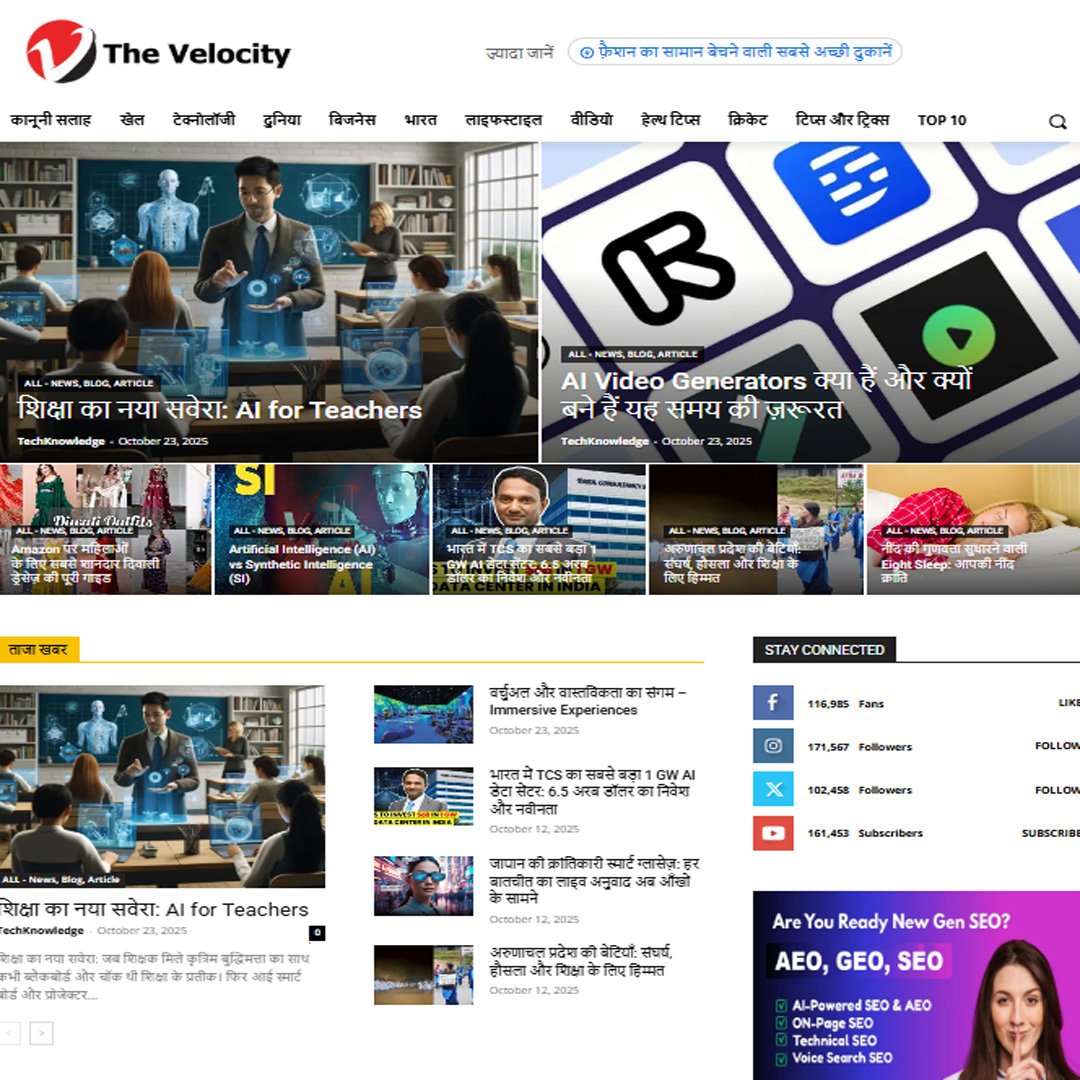When Technology Learns to Heal
In a quiet hospital corridor in Bengaluru, a doctor checks her tablet not just for lab reports but also for predictions — AI-generated insights that tell her which patient may develop complications before symptoms even appear. This isn’t science fiction anymore. It’s happening here, in Indian hospitals, powered by AI in healthcare and precision medicine that learns, adapts, and heals at scale.
From early disease detection to tailoring drugs for an individual’s DNA, this new wave of digital medicine could redefine how humanity experiences health. And for a country as vast and diverse as India, the impact could be nothing short of transformative.
The Birth of Smart Healing: How AI Enters Medicine
Artificial intelligence’s entry into healthcare began as a whisper — basic pattern recognition, data sorting, and radiology support. But as machine learning and neural networks matured, AI evolved into a predictive powerhouse.
Today, AI algorithms analyze millions of data points from electronic health records, wearable sensors, genomic sequencing, and real-time monitoring devices to help clinicians make data-backed decisions. This isn’t just making medicine faster; it’s making it smarter.
A study published by the National Institute for Transforming India (NITI Aayog) projected that AI could add $957 billion to India’s economy by 2035, with healthcare being one of the most promising sectors.
The Indian Context: Why Healthcare Needs AI
India’s healthcare system, while innovative, faces chronic challenges — doctor shortages, uneven infrastructure, rural undercoverage, and rising non-communicable diseases. The country has roughly one doctor per 1,456 people, far short of the WHO-recommended ratio.
This gap is where AI in healthcare and precision medicine becomes not just a luxury but a necessity. Imagine clinics in remote Assam or Madhya Pradesh where telemedicine AI tools instantly diagnose tuberculosis from chest X-rays. Or AI chatbots assisting frontline workers in documenting patient symptoms in regional languages, guiding them through evidence-based care steps.
AI helps bridge the gap between capacity and care, ensuring that no one is left behind.
Deep Data: The DNA of Precision Medicine
Precision medicine represents a shift from “one-size-fits-all” to “one-size-fits-one.” It integrates genomic data, lifestyle, and environment to tailor treatment to each individual. Here, AI acts as the scientist’s partner — decoding patterns invisible to human eyes.
For example, Mumbai’s Tata Memorial Centre uses AI-driven algorithms to detect early signs of oral cancer from photographs, achieving accuracy levels comparable to trained oncologists. This helps in faster screening, especially in rural areas where pathologists are scarce.
Similarly, at AIIMS Delhi, projects leverage genomic sequencing combined with AI analytics to predict hereditary disease risks — from cancer to cardiovascular conditions — before they become life-threatening.
How AI Makes Healthcare Personal
Precision medicine powered by AI works in three powerful stages:
- Data Gathering – AI collects patient data from health records, gene profiles, and imaging tools.
- Pattern Recognition – Machine learning systems detect disease markers and probable treatment outcomes.
- Decision Support – AI recommends personalized therapies, drug options, and preventive measures based on predictive analytics.
Take diabetes management in India as an example. Wellthy Therapeutics, an Indian digital health startup, uses AI-powered behavior models to provide individualized treatment plans, helping patients maintain sugar levels with real-time feedback.
AI as a Lifesaver in Diagnosis
Across the world, and increasingly in India, AI in healthcare and precision medicine has started outperforming humans in diagnostics.
- Radiology: Algorithms can detect lung cancer nodules or brain hemorrhages within seconds, sometimes faster than radiologists.
- Pathology: AI-assisted microscopes scan samples and flag abnormalities with remarkable accuracy.
- Cardiology: AI ECG tools predict heart attacks before traditional risk systems do.
For instance, Qure.ai, a Mumbai-based AI company, trained systems to review X-rays for tuberculosis. Their platform was adopted by India’s public health initiatives during the pandemic to support rapid screening across multiple states.
These advancements show how AI in healthcare and precision medicine blends technology and empathy, enabling timely intervention even where human expertise is limited.
AI in Surgery and Robotics: The Future Has Hands
In operation theaters, surgical robots guided by AI are already making waves. The da Vinci Surgical System, now used in Indian multispecialty hospitals like Apollo and Fortis, allows surgeons to perform minimally invasive procedures with unmatched precision.
AI-powered robotic systems provide real-time navigation, adapt to patient-specific anatomy, and reduce recovery times significantly. By combining human judgment with algorithmic foresight, the surgical table becomes a space where man and machine collaborate to save lives.
Drug Discovery and Clinical Trials – Accelerating Possibilities
Developing a drug traditionally takes over a decade, often costing billions. But AI shortens that cycle dramatically. Machine learning predicts molecular behavior, identifies promising compounds, and simulates trial outcomes using big data analytics.
Startups like InSilico Medicine and India’s own Tata Consultancy Services (TCS) are using AI for drug repurposing, testing how existing drugs can target new diseases efficiently.
Moreover, clinical trials benefit from AI’s ability to predict patient responses and flag potential side effects early, improving transparency and safety.
Telemedicine Meets AI: Healing Across Distances
India’s rural populations often struggle for timely healthcare. Here, AI-powered telehealth platforms are changing the narrative. During the COVID-19 pandemic, apps like Practo and 1mg introduced AI chatbots that pre-screened patients, guided triage, and eased doctor workloads.
Today, similar systems continue to evolve — smart assistants offering instant medical guidance in local languages, helping frontline workers manage rural outreach.
When combined with IoT-enabled wearable devices like pulse oximeters and heart monitors, AI ensures that a cardiologist in Delhi can track a patient’s recovery in Nagaland in real time.
Ethical Questions: Can Machines Be Trusted with Health?
With every technological leap, ethical dilemmas follow. AI’s ability to sift, predict, and decide requires deep responsibility. What if an algorithm misdiagnoses a condition or leaks sensitive genomic data?
India’s recent efforts under Digital Personal Data Protection Act (2023) are laying the foundation for secure digital health practices. It emphasizes patient consent, transparency, and accountability — essential pillars to ensure AI in healthcare and precision medicine remains humane and trustworthy.
Moreover, medical AI doesn’t replace doctors; it empowers them. The future of medicine hinges on collaboration, not competition, between human insight and machine intelligence.
Real Human Stories: Healing with AI in India
- A Child in Pune: Diagnosed with a rare liver condition using AI-assisted imaging that spotted anomalies invisible in early scans.
- A Farmer in Rajasthan: A chatbot in Hindi guided him to identify early diabetes symptoms, now under control thanks to AI-based dietary monitoring.
- An Elderly Woman in Chennai: Her wearable device alerted doctors minutes before a cardiac arrest, a life saved because algorithms learned her heartbeat patterns.
These aren’t future fantasies — they’re realities unfolding across Indian cities and villages today.
AI in Mental Health: The Silent Revolution
Mental health is one of India’s greatest, often overlooked, public health challenges. AI-driven mental wellness apps like Wysa and MindPeers offer personalized emotional support, using natural language processing to detect distress patterns.
They may not replace therapists, but they make mental health care accessible 24/7, especially for those who cannot afford traditional counselling. It’s technology helping people reconnect with humanity.
Government and Industry: Building India’s AI Healthcare Ecosystem
India’s National Digital Health Mission (NDHM) aims to unify the healthcare ecosystem through digital records and interoperable health IDs. AI plays a central role in analyzing this national dataset ethically and effectively.
Meanwhile, startups such as Qure.ai, HealthifyMe, Niramai, and SigTuple showcase Indian innovation on global stages. Niramai’s breast cancer screening tool, powered by thermal imaging and AI, offers non-invasive, radiation-free diagnostics — particularly suited for rural women who avoid traditional mammograms.
This synergy between policy, innovation, and academia could position India as a global leader in AI in healthcare and precision medicine by the end of this decade.
The Economics: Healthy Nation, Wealthy Future
According to an EY-FICCI report, AI could streamline hospital operations, saving the Indian healthcare sector billions annually by reducing diagnostic errors and administrative inefficiencies.
Automated image analysis alone could save nearly 20% of diagnostic costs, while AI-driven scheduling and patient management can optimize hospital throughput and staff allocation.
As healthcare integrates data smarter and faster, economic growth will not rely purely on infrastructure but on intelligence infrastructure.
The Road Ahead: Challenges and Innovations
Despite success stories, challenges remain — lack of AI-skilled professionals, fragmented healthcare data, inadequate digital literacy, and ethical considerations.
To truly harness AI in healthcare and precision medicine, India must:
- Invest in public-private research collaborations.
- Promote open and ethical data sharing frameworks.
- Train medical professionals in digital literacy.
- Strengthen cybersecurity protections for patient data.
- Encourage startups under programs like Startup India and Atal Innovation Mission.
These reforms can make India not just a user but a builder of global medical AI innovations.
KnowTheAI.in Perspective: Education as the Real Vaccine
At KnowTheAI.in, our mission is to empower readers, professionals, and innovators with knowledge about how AI in healthcare and precision medicine is reshaping lives. From explaining emerging technologies to showcasing practical breakthroughs, the platform bridges curiosity with real-world learning.
AI is not just changing healthcare — it’s challenging us to think differently about humanity, compassion, and the ethics of intelligence itself. The more we understand it, the better we can guide its evolution toward good.
The Future We’re Healing Toward
The story of medicine is no longer written only in hospitals but in code, data, and compassionate foresight. Imagine an India where no patient dies from lack of early detection, where doctors rely on algorithms for guidance but make decisions with heart, and where every citizen benefits from personalized, predictive, and preventive care.
That is the vision of AI in healthcare and precision medicine — a partnership of empathy and intelligence.
For more insights and research updates, visit KnowTheAI.in or connect for collaborations and editorial inquiries.









